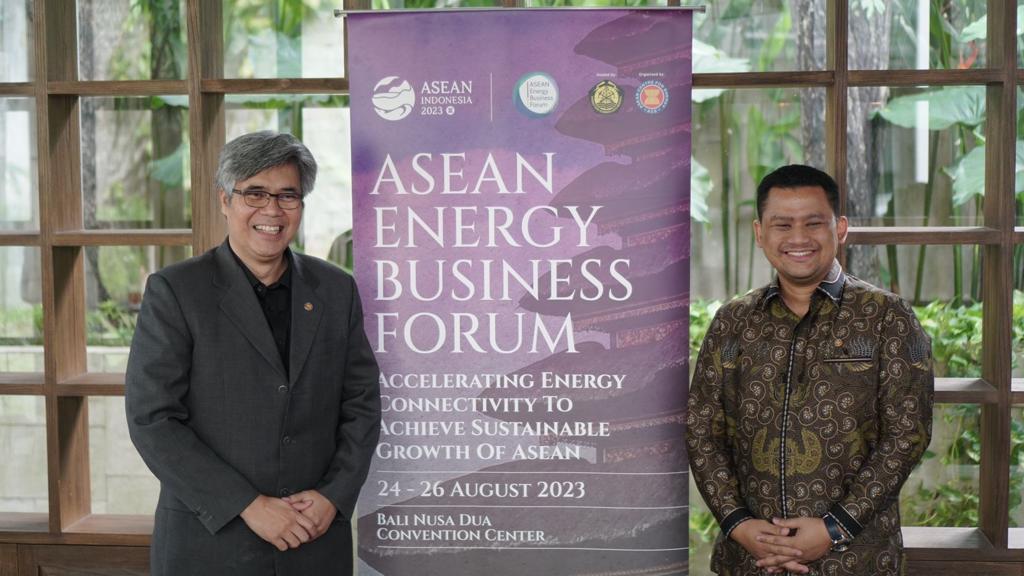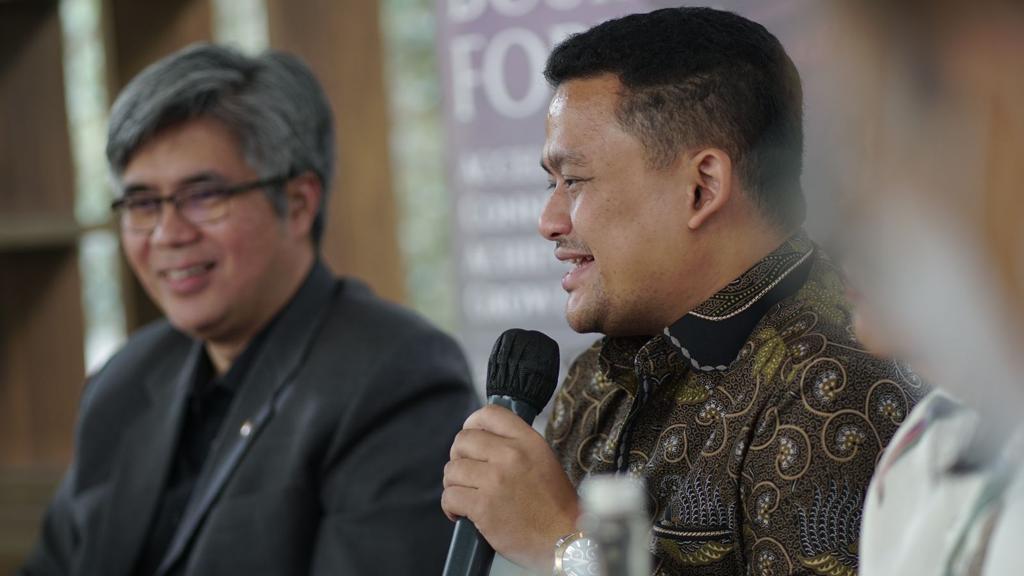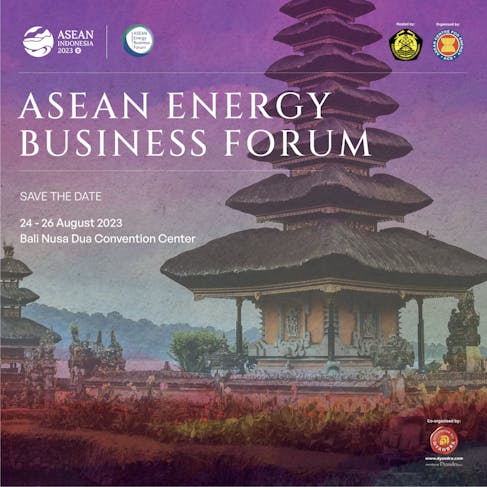Menu

Jakarta, 28 July 2023 – To discuss collaboration related to the growth of the energy business in the Southeast Asian region, the Indonesian Ministry of Energy and Mineral Resources, in partnership with the ASEAN Centre for Energy (ACE), initiated the annual ASEAN Energy Business Forum (AEBF) 2023 event in Bali, Indonesia on 24-26 August 2023.
The forum, which is centred on “Accelerating Energy Connectivity to Achieve Sustainable Growth of ASEAN,” is essential for the region’s development. It aligns with Indonesia’s Chairmanship vision of establishing ASEAN as a regional and global economic growth hub, a crucial objective for the entire region.
Executive Director of ACE, Dr Nuki Agya Utama, has firmly emphasized addressing energy-related challenges in Southeast Asia. As an ASEAN think tank in the energy sector, ACE plays a critical and increasingly vital role, particularly in the ongoing transition from fossil fuels to renewable energy (EBT).
“The AEBF aims to foster collaboration and partnership among stakeholders in the energy sector. It includes businesses, governments of ASEAN member nations, and the academic community. Together, we can address critical energy-related issues such as technology, supply, security, and advancements in knowledge.” explained Dr Nuki on Thursday (27/7/2023).

Furthermore, Dr Nuki said that energy security is of utmost importance in the Southeast Asian region and requires urgent attention to avoid potential destabilization among ASEAN member countries. It is strongly recommended that nations take proactive measures to enhance their investment ecosystems and shift toward sustainable energy sources. These actions will foster regional stability and open doors to economic growth and prosperity.
“We can’t afford to overlook the importance of a stable, low-cost, and easily accessible energy supply, especially as our region is projected to become the fourth largest in the world in the next decade. We must prioritize finding solutions that promote energy security, affordability, accessibility, and sustainability. AEBF remains steadfast in our dedication to identifying and implementing such solutions to ensure a brighter and more sustainable future for all,” said Dr Nuki.
Pursuing sustainable energy should not be limited to new and renewable energy sources. Instead, exploring safe and viable nuclear energy should also be a topic of discussion. The ACE study suggests that while technologies such as solar cells and wind energy are not suitable for use as the primary energy source in ASEAN, because of its intermittent nature as well as the main obstacles about the grid infrastructure is still not sufficiently large capacity and not connected massively.
“Resolving the energy problem in Southeast Asia is a matter of supply and sustainability. It’s important to consider the unique energy sources available in each country and region. In Southeast Asia, there is a significant potential for utilizing water and geothermal resources, along with biofuels and biomass,” said Dr Nuki.
The AEBF is dedicated to paving the way for sustainable energy solutions accessible to the ASEAN community. We firmly believe there are viable alternatives to the conventional reliance on oil and gas. By exploring these options, we can establish a more diverse and resilient energy landscape in our region. The AEBF also brought together prominent industry leaders from Southeast Asia and significant corporate entities from Russia, the US, China, and Japan.
According to Dr Nuki, the region aims to collaborate with external allies to bring technological innovations and knowledge transfer. The potential consequences of conflicts between major nations are mainly on the geopolitical and geoeconomics fronts. However, Southeast Asia’s neutral stance could attract all factions involved in such disputes to work together and benefit the region.
In order to promote a sustainable energy transition within the ASEAN region, we must invest significantly in the required infrastructure. This undertaking will necessitate substantial investments, funding, and collaboration from the business community. Additionally, we must address the technical challenges associated with this transition to ensure its success. We must also consider the potential economic benefits that may result from this transition while minimizing any social disruption that may arise.
The AEBF is taking place alongside two significant conferences: the 41st ASEAN Ministers on Energy Meeting (AMEM) and the 3rd ASEAN International Conference on Energy and Environment (AICEE). It is a commendable convergence of events as it amplifies their respective impacts and relevance. The collaborative efforts these gatherings encourage will be crucial in advancing ASEAN’s standing as a vibrant and influential player in the global energy arena. It is pivotal to establish robust relationships, and this confluence of events serves as an excellent platform to achieve that objective.
To complement AEBF, ACE will also hold the Green Transport Rally (GTR). The event presents an excellent opportunity to promote the positive environmental impact and energy efficiency of electric vehicles while also raising awareness about sustainable transportation options such as biofuel-fired vehicles.

The upcoming GTR event is set to be an impressive showcase of vehicles journeying from Jakarta to Bali, all to promote innovation and advance ASEAN’s efforts toward a more eco-friendly transportation system. The event’s host, ACE’s Manager of Corporate Affairs, and AEBF’s Chairman, Dr Andy Tirta, has highlighted the exciting opportunity this presents to display the latest advancements in sustainable travel.
In addition, the forthcoming ASEAN Energy Awards will serve as a commendation for distinguished industry members who have made significant contributions to the growth and progress of the energy sector. Moreover, the 4th ASEAN Energy Youth Awards will recognize young individuals who have made notable strides in developing sustainable energy within the region.
According to Dr Andy, Southeast Asia must sustain its political and economic stability amid the current tensions in Europe. The key to progress for this region lies in prioritizing collaboration, cooperation, and interconnectivity, particularly in the energy sector.
“We should understand that energy is a catalyst for peace rather than war. By prioritizing connectivity, we can establish a secure, cost-effective energy system that benefits everyone. It requires a comprehensive and innovative financial analysis that involves collaboration between public and private financing sources, industry players, Multilateral Development Banks, and other financial institutions. The AEBF serves as an excellent platform for this purpose, creating opportunities for future business collaborations between entrepreneurs, government officials, and fellow business professionals.”
In line with Dr Nuki and Dr Andy, Director of Electricity Development, Directorate General of Electricity, Ministry of Energy and Mineral Resources of Indonesia, Ir. Wanhar strongly endorsed international collaboration to foster interconnectivity and sustainability in the Southeast Asian region. He emphasized the importance of leveraging platforms like the AEBF to facilitate joint efforts toward a greener future for the region.
“AEBF is a significant event for energy-related experts in the ASEAN region. It brings together policymakers and business players from both regional and international spheres. The ASEAN region has a wealth of energy resources that must be harnessed to meet the growing demands and ensure energy security and resilience. This will help the region’s economy and businesses to continue to thrive,” stated Ir. Wanhar.

About ASEAN Centre for Energy (ACE)
Established on 1 January 1999, the ASEAN Centre for Energy (ACE) is an intergovernmental organisation within the Association of Southeast Asian Nations’ (ASEAN) structure that represents the 10 ASEAN Member States’ (AMS) interests in the energy sector. ACE supports the operations of Energy Subsector Networks (SSN) and Specialised Energy Bodies (SEB) under the ASEAN Plan of Action for Energy Cooperation (APAEC), a blueprint for better collaboration towards upgrading energy. The Centre is guided by a Governing Council composed of Senior Officials on Energy from each AMS and a representative from the ASEAN Secretariat as an ex-officio member.
On 26 May 2015, ACE Governing Council endorsed the business plan of an Enhanced ACE; a high-performing institution and a regional centre of excellence which builds a coherent, coordinated, focused and robust energy policy agenda and strategy for ASEAN. The three key roles of the Enhanced ACE:
Keeping the region’s improvement, sustainable and harmless to the ecosystem is a fundamental concern of the ASEAN energy sector.
Hosted by the Ministry of Energy and Mineral Resources of Indonesia, ACE’s office is located in Jakarta, Indonesia.
Media contact:
For media inquiries, please contact:
[email protected]
Communications Team
Corporate Affairs Department
